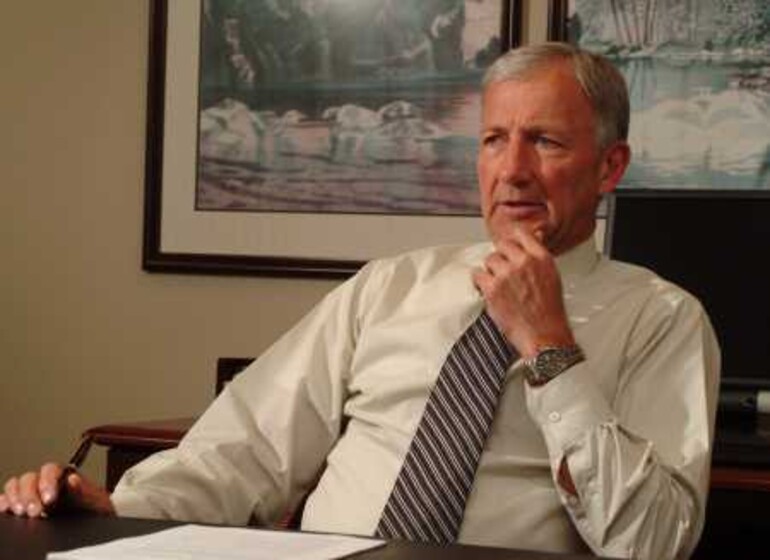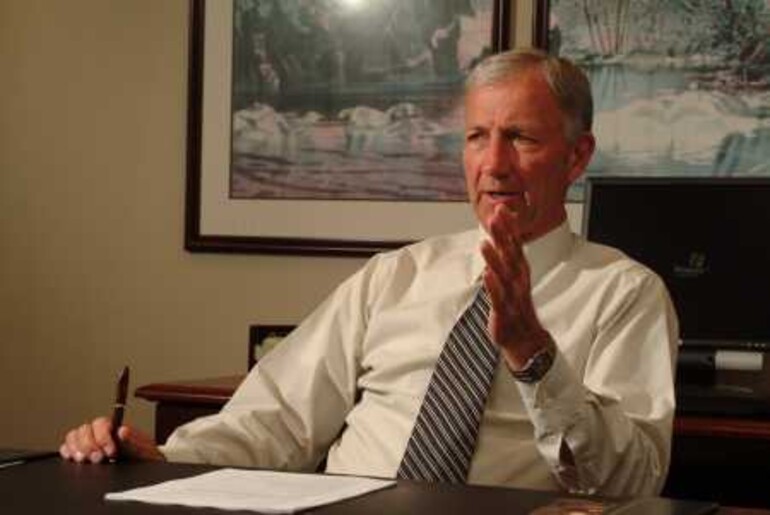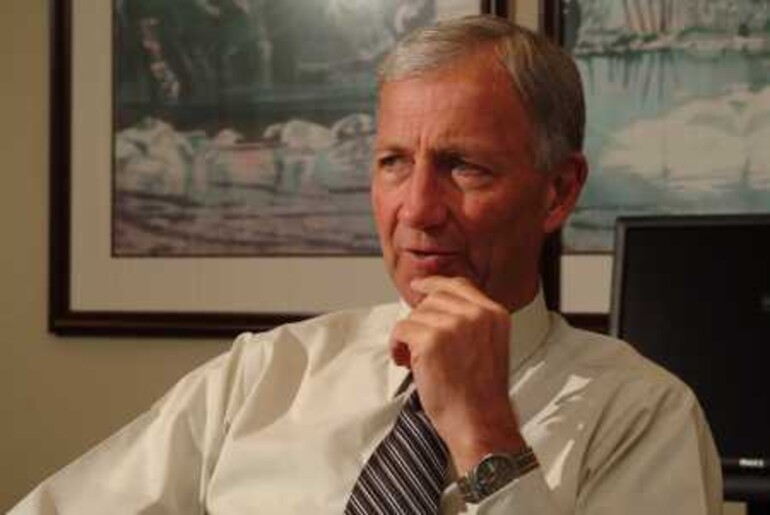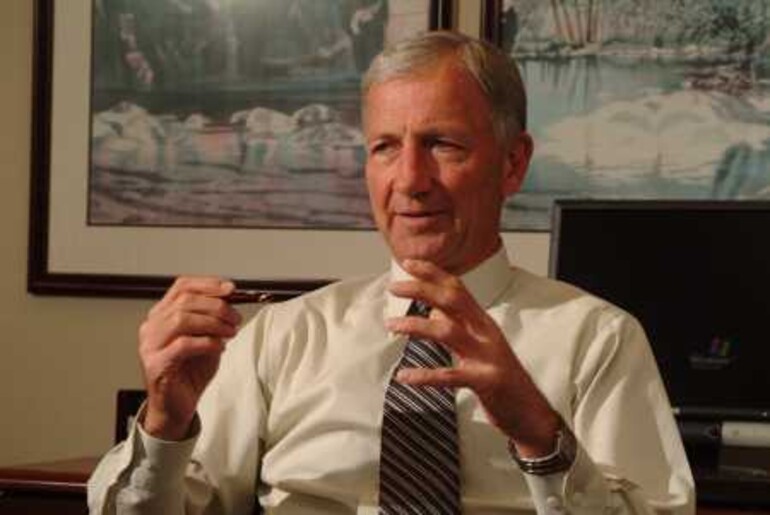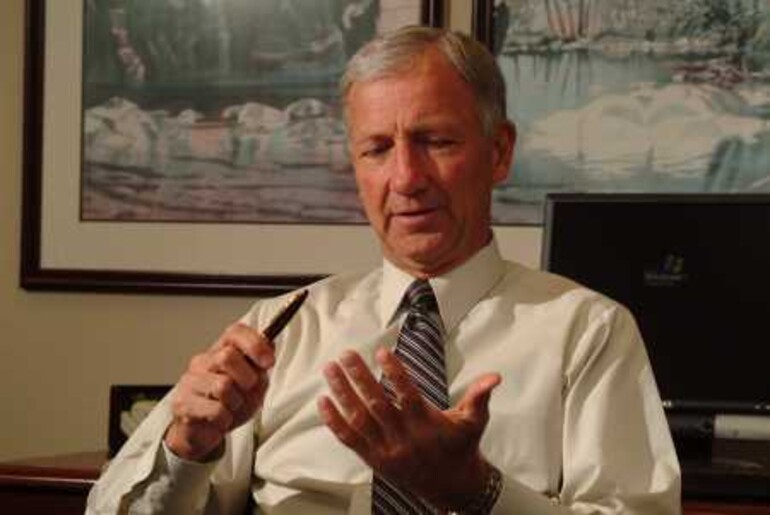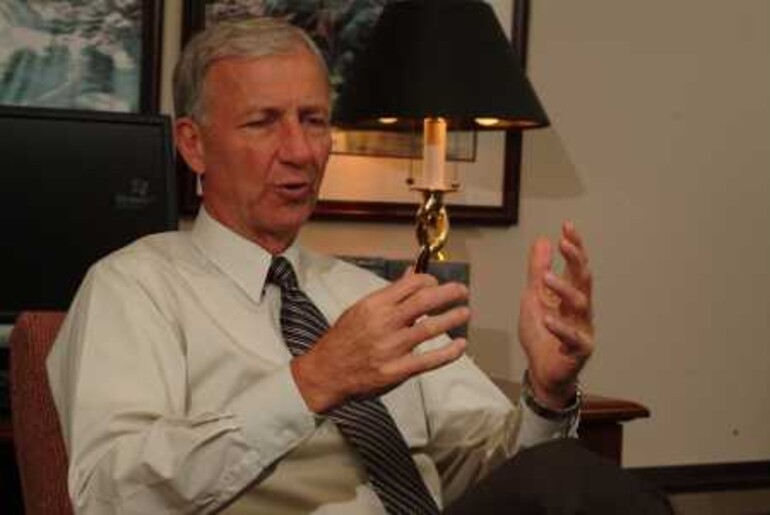This is the first of a three-part series of interviews with the officers of the North Pacific Union Conference. These interviews are presented with the hope that they will provide the readers a greater understanding of the scope, structure and workings of the Adventist Church.—Editor
GLEANER: Since you began as North Pacific Union Conference president in 1996, you have encouraged Northwest members to get involved in global mission outreach. How do you feel that goal has impacted our churches and members here?
Patzer: Well, that whole emphasis didn't originate with me—it's really part of our Adventist calling. In the early 90s our previous president, Bruce Johnston, had the vision for Operation Bearhug. When we saw the tremendous needs in the former Soviet Union with our own eyes, I think it shook us up and compelled us to believe that when a door opens, we're called to walk through it. Now literally thousands of us, including academy students, laypersons and pastors, have gone on short-term mission trips.
There's no doubt in my mind that these experiences have changed us for the better. We've certainly given a lot with countless hours of donated time along with millions of dollars to build churches, hold evangelistic meetings and bring medical assistance. But each time we go, we bring back new appreciation for our brothers and sisters in other lands who are on fire for the Lord in spite of huge challenges. They inspire us to renew our own commitment to the work God has given us right here at home.
But is all the time and effort dedicated to global evangelism helping or hindering local evangelism right here in our own Northwest churches and communities?
One of my favorite statements from Ellen White is that the best way to strengthen the home field is to invest in foreign missions. While our Northwest members continue to lead the North American Division in per capita tithe giving and mission contributions, I believe the investment she refers to is more than just money, and it's not just short term. The long-term effect will be greater than we now realize. For example, our academy students who have spent time on a mission trip in a different culture come back with a renewed focus that will positively affect their choices and connection with our church's mission for years to come.
But, having said that, I am disappointed that the enthusiasm for global evangelism has not transferred directly to local evangelism here at home. God has called us to be just as active in working and praying for new conversions here in the Northwest as we are abroad. A healthy church should expect to grow by at least five percent each year, whereas here we are averaging less than two percent.
Do you believe that is a trend we can change?
Absolutely. People in the Northwest may be unchurched, but they are still looking for answers; they're looking for hope. I know some of our members and even pastors feel that public evangelism or reaping meetings are outdated and don’t work. I disagree. When churches do evangelism, when they have a long-term commitment to outreach, and do it regularly, people respond. And I don't mean just the pastor—it takes every member learning to make evangelism a lifestyle.
This spring we were on a short-term mission trip with many of our Northwest members to Bolivia, where they talked about Evangel-Living. That's their theme, and it says it all. We need that same mindset here in the Northwest. Our local conference presidents agree, and together we are working on some specific plans that I hope will give new momentum to our churches and members in the near future.
Speaking of our local conferences, some members don't understand the difference between their local conference and the union conference. How would you explain the differing roles?
Good question. Ultimately the entire organization of the Adventist Church is focused on making sure support and funding is sent where it is needed most. Obviously the local church is best able to understand and respond to the immediate needs of its own community. But there are some things that require more resources or coordination than what a local church can easily provide—for instance running a boarding academy or a youth camp. And so they join together in what we call conferences, which help coordinate support services directly to their churches, pastors and members.
So, then, why do we need union conferences?
I've worked as a pastor, a local conference youth director and administrator, and now as a union conference president. I've seen all sides of the system and still think it is working. Ideally the union conference ensures that the needs of the smaller conferences, with fewer inherent members and resources, do not suffer while larger conferences flourish. The members in each of our conferences, small and large, receive the benefits of the monthly GLEANER, Northwest Spotlight on Mission DVDs that are mailed to each church quarterly, Sabbath work accommodation or labor union help, certified Adventist teachers, loans for church and school building projects, and other services because of the North Pacific Union Conference.
These services are made possible because the union conference territory is large enough to pool sufficient resources, yet small enough to be responsive. The NPUC revolving fund is a great example, in which our Northwest members currently have nearly $30 million invested. They not only receive a competitive interest rate in return, but those funds are used to provide loans to our local churches and schools.
I remember one time our NPUC executive committee got into a discussion about the education department staffing. Someone said, “Why do we need to hire an assistant in the department?”
One of the committee members said, “Because we need them to help give supervision to our small conferences.” To which the person said, “Then why don’t a couple of you small conferences hire that person.” To which a conference president gave a classic reply, “We have, it’s called a union.”
That really embodies the reason for a union. Not duplicating but bringing efficiency and expertise in response to the local conference needs.
What do you see as your greatest challenge as union president?
Trying to keep communication lines open and maintain unity would rank near the top. I visit churches and camp meetings as often as possible. I am closely involved with all of our local conference committees—I believe they provide accountability and a chance to hear other viewpoints. Ultimately, I want us all, with our growing diversity here in the Northwest, to move together with a common vision of what God has called us to be and to do. And beyond even our own membership, I hope to communicate something about our church to our larger Northwest community, which is why I maintain a regular presence on the radio with Issues and Interviews, carried in most of the major markets.
Two key areas you have emphasized while president are mission focus and biblical theology. Where do you see those trends heading?
Well, I'm troubled that some churches have eliminated Sabbath School as a part of their Sabbath services. Sabbath Schools were originally founded to promote three things—fellowship, study of the Word and missions. Most churches do well with the first two. However, it's important that we not neglect the mission emphasis. We are a world church, not a national church, and missions both here and overseas are an important part of God's vision for us.
I would hope that every church can find a way to revitalize an exciting home and foreign mission emphasis. I recommend doing it each Sabbath for a few minutes after everyone has reconvened in the sanctuary.
This is the main reason that our quarterly Northwest Spotlight on Mission DVD was created. These programs are filled with great stories and testimonies from our own Northwest members. Every quarter two copies are sent free to each church. I am disappointed that some churches still aren’t using them.
And, in the area of our beliefs and theology?
Well, yes, according to Adherents.com, our worldwide Adventist Church is now the eighth largest international church and growing exponentially. Yet, with this growth, how do we make sure our belief system stays firmly connected to biblical truth? How do we effectively pass the torch to new generations and new members?
Our church is pretty open to allowing individual members the right to hold their own views theologically within certain parameters. But when it comes to key doctrines such as the biblical creation account and our understanding of inspiration and revelation, we need some basic agreement. And particularly, I believe, the vast majority of our membership expects that those who teach in our schools or preach in our churches will not only articulate but personally believe the fundamentals of our church.
So what are we doing about it?
Well, so far we have had 30 Faith in Focus Forums where we have invited top Adventist scholars, theologians and scientists to various churches in each of our conferences around the Northwest to candidly discuss the issues. I believe this has encouraged thoughtful Adventists to maintain their confidence in the biblical basis of our Adventist beliefs.
While we certainly don’t have all the answers in archeology or science, we do have sufficient evidence that, when coupled with faith, gives us assurance.
In light of today’s efforts by many corporations to downsize, what have you done to make the NPUC operation as efficient as possible?
A couple years ago we trimmed our union staff by around 15 percent. The office we will move to this fall will be significantly smaller in square footage than our old building. But rather than simple "downsizing," I'd like to suggest a better word is “rightsizing,” which means that we are more likely to adjust or shift resources or staff to new areas of need. Fifteen years ago we had no idea that we would need an informational technology department, yet now every office does most of its work with computers. The idea is to shift resources to where they are needed to help our church's mission go forward as efficiently as possible.
What's the purpose or rationale behind the flurry of new buildings for conferences and even the union office? How do these investments impact the work of our local churches?
Investment is a good word. There are no "ivory palaces" being designed or built. But it is necessary for every organization to periodically reassess its priorities, and sometimes it is more efficient to sell an older facility than to spend enormous sums of money to bring it up to current codes. Former NPUC president Elmer Walde realized that when he led out in our previous office relocation in 1970. God has enabled us to sell existing facilities and relocate in areas where property values are on the dramatic rise. This means the investments will grow and provide greater potential resources for our church and its mission in the future. Furthermore, as I already indicated, the staffing needs and adjustments in all of our offices have changed what we need to be cost-effective. These investments, if done prayerfully and carefully, ensure that the services most needed by our members and churches will continue to be provided in a timely and efficient manner.
Do you believe the popular evangelical groundswell towards “mega-churches” is a positive trend that will carry over to the Adventist Church?
I just read a national study released in February that says Protestant churches with a regular attendance in excess of 2,000 per week have doubled in the last five years. I think our normal Adventist philosophy somewhat mitigates against that. Our strategy usually involves many smaller churches in an attempt to have a multifaceted influence.
Yet we can learn a lot of positive things from what these mega-churches are doing right. David Travis of the church consulting group Leadership Network says regarding successful churches, “Today people demand quality... they find quality almost everywhere else in their lives and expect it in all venues—music, visuals, preaching....” So our churches, large or small, should do all they can to have a beautiful, inspiring Sabbath School and church service.
A second emphasis of many mega-churches that we could and should emulate is that they intentionally are evangelistic and racially inclusive.
What do you see as the greatest need for our Northwest churches: outreach and evangelism, or care and feeding of the present flock?
The obvious answer is yes to both. The over-emphasis of one to the neglect of the other is counterproductive. But if there is one fault that I see more often, it would be “hovering” over the flock. When the work originally moved to the West Coast 100 years ago, Ellen G. White was adamant that pastors should be out raising up the new work, not “hovering” over the sheep, tending to perpetuate weak flocks. Today the model that she advocated has been lost, and we are paying a price. She believed the best way to have a healthy, growing church was to be involved in evangelism, and I concur.
You have spent quite a bit of time analyzing principles of leadership and even authored a book about it. Has the style of church leadership changed significantly in the past few decades?
Yes, it has. I’ve been in church administration now for more than 20 years and times have changed. There was a time when a conference president spoke, it was law. I remember how on the second weekend of camp meeting all the pastoral changes were announced with little or no prior church involvement. Or if a pastor dared come to year-end ministers’ meeting without his Ingathering goal he was liable to be sent home to raise it or have his check held up until he did.
Today we are much less autocratic, much more process oriented. And while it may not always be as efficient (there’s nothing like a dictator for efficiency), there is greater involvement, accountability and hopefully buy-in.
As of this year, the North Pacific Union Conference has helped coordinate Adventist work in the Northwest for 100 years. Do you believe our mission today has changed from that of the early pioneers?
I read recently about how the delegates for the newly organized North Pacific Union Conference adopted a mission statement that read as follows, “The object of this conference shall be to unify and extend the work of the everlasting Gospel throughout this conference and the mission fields of the world.”
As I've thought about that, I’ve been encouraged that the basic purpose for our existence has not changed. We're still a people obsessed with the coming of Jesus, hopefully, considering world conditions, even more so than our forefathers. That drives us to prepare our families, our churches, our brothers and sisters here and abroad—to know Jesus, to accept His offer of salvation by faith and to serve Him by sharing His Good News with everyone.
One of my friends recently declared to me, "We are living in the last of the last days." I believe Jesus must and will return soon. To that event, I commit my life and challenge our members to join me.




